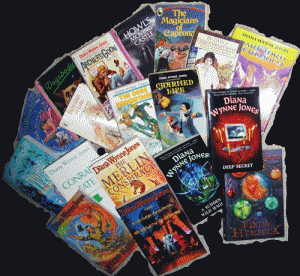It’s a sad and reflective time in the BW hovel today, with news that the great Diana Wynne Jones has passed away.
It’s no exaggeration to say that this author changed my life, though I never met her. Certainly she changed my reading habits, for though, as a child, I had already discovered fantasy through such books as Alice in Wonderland and the Chronicles of Narnia, it was Diana Wynne Jones who really brought my love of the genre to life. My devotion to her stories was enough for me to decide at quite a young age that one day I would not only work with books, but I would work with books just like these.
My first DWJ was Charmed Life, given to me by a book-loving relative when I was somewhere around seven or eight years old. I fell head over heels from the first page and from then on my whole family ensured I was regularly supplied with a DWJ fix. This was not always easy, particularly during the dark days when so many of her works seemed to be out of print – sometimes my habit was fuelled with ancient, second-hand copies, the covers sticky and grimy with age. But I didn’t care. Only the stories inside mattered, and those were intact.
Later there were reprints as fantasy fell back into publishing-favour, and I quickly gathered up books I hadn’t even realised were missing from my collection. That same relative who’d gifted me with my first DWJ continued sending adult-me the latest releases when she came across them.
Meanwhile I’d found a more immediate source – a friend who worked at the local arm of DWJ’s publisher occasionally provided me with advance copies.
As an adult, I reread the books and marvel at the layers – the hidden themes and meaning (often so much darker and more serious than I ever realised as a child), the different historical and mythological elements that are woven into the various tales. But reading as a child it was the simple things I adored.
Despite having no interest in science, I wanted a chemistry set like the ones in The Ogre Downstairs. And  I developed a peculiar fascination with matchbooks after reading Charmed Life and Eight Days of Luke. To this day, I get a little thrill every time I find one – so much more magical and olde worlde than a matchbox.
I developed a peculiar fascination with matchbooks after reading Charmed Life and Eight Days of Luke. To this day, I get a little thrill every time I find one – so much more magical and olde worlde than a matchbox.
Of course, with Diana Wynne Jones books it is the very ordinariness mixed in with the magic and quirkiness that make them so special. There is something delightful in the notion that a powerful enchanter might use plain old stainless steel in place of the “proper” silver cutlery that cripples him. Jones’s heroes are nearly all ordinary people, complete with their own flaws and foibles, and while sometimes they perform magnificent feats, nine times out of ten, it’s their ordinary strength and wit and courage and mostly common sense that sees them through outlandish and twisted circumstances; staring down the most wicked, selfish, pompous and powerful villains. And usually, the hardest thing they have to overcome is not the wild and magical danger, but the very ordinary and human traits of doubt and fear of being humiliated.
Her books are things to be treasured but, I learned, shared sparingly and cautiously. Having once given a good friend a copy of Fire and Hemlock (my own best-beloved copy deemed far too precious to leave the house) I was horrified when she casually told me she’d thought it was ‘quite good’ but ‘a bit weird’. I loved my friend a tiny bit less after that faint praise and vowed never to chance Charmed Life on anyone unless I could be certain of appropriate levels of adoration.
In the online world I have since met hundreds of the millions of DWJ devotees out there. Now I find it commonplace to see blog discussions on the merits of Howl or stranded commuters tweeting requests to Hathaway for a bus.
What a wonderful legacy she has left us with. And how sad for everyone that she has left so soon.







